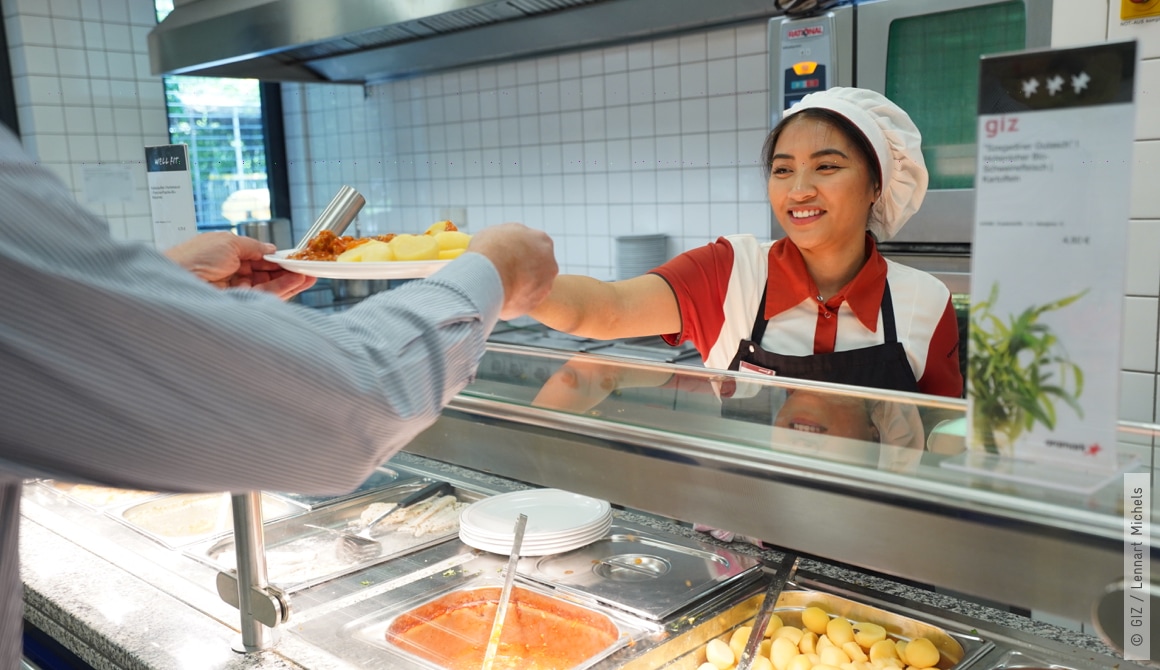Embracing sustainability in both events and procurement

Organising our internal events offers an opportunity for people to experience sustainability hands-on. German procurement law allows us to apply sustainability criteria when using public funds. Being mindful of the goal of ensuring value for money, we take even greater account of social, environmental and innovative aspects in procurement.
SUSTAINABLE EVENT MANAGEMENT
Events offer an opportunity to make the three dimensions of sustainability tangible – social responsibility, ecological balance and economic capability. Many sustainable event management measures can also be transferred directly to everyday office life, resulting in greater sustainability in the company as a whole.
GIZ supports its staff in organising successful sustainable events. To this end, the company published its Guide – Sustainable Event Management in 2018. It guides employees through the phases involved in planning, communicating, realising and following up on events. The publication replaces the GIZ Navigator for Sustainable Event Management.
Besides holding learning workshops with interested staff members and webinars for the field structure, the Sustainability Office also advised several key events for the company in 2018. An analysis has shown that employees need additional assistance. Mandatory minimum standards for event management are to be developed to this end in 2019.
FOCUS ON SUSTAINABLE PROCUREMENT
GIZ’s Procurement and Contracting Division is responsible for the cost-effective procurement of services, materials and equipment in line with the requirements of the relevant commission and contract award legislation, and for making financing arrangements. As well as advising on and designing procurement processes, we organise training measures and develop guidelines, formats, and orientation and rules (O+R).
In doing so, GIZ places particular emphasis on sustainable procurement, and has set itself the goal of ensuring that by 2020 all equipment, materials and services procurements satisfy the toughest sustainability criteria. In 2018, we therefore reviewed and refined the sustainability criteria used in tenders for important framework agreements, such as green electricity, printed products and cars.
Taking tenders for printed products as an example, manufacturing must first be climate-neutral and products must be delivered within Germany. In addition to mandatory compliance with GIZ integrity standards, we also require up-to-date PEFC and/or FSC certification to ensure the sustainability of the raw materials that are used. In tenders for offset printing, we require the printer to be certified in accordance with the Blue Angel criteria and expect Process Standard Offset (PSO) certification as an additional quality criterion.
ENVIRONMENTAL CRITERIA PLAY A MAJOR ROLE
The Procurement and Contracting Division and the Sustainability Office regularly share information. The goal is to take account of sustainability criteria in all relevant tenders. The agreed criteria – such as compliance with the Blue Angel eco-label, RAL standards, energy-saving mode and packaging disposal – will then be an integral part of any subsequent contract.
The Procurement and Contracting Division also identifies other sourced product groups and services that are particularly environmentally relevant. The second step is to assess whether we have any leverage to impose sustainability criteria on bidders and on their products and services.
We inform our key suppliers of our Environmental Statement and our environmental activities to encourage them to step up their efforts to protect the environment and benefit from our experience.
In the tender documents for all key framework tenders, we point out that we are EMAS-certified and that, in the long term, we intend to source only goods and services whose entire life cycle and supply chain complies with the sustainability and social criteria GIZ applies to itself.
INSISTING ON LOCAL PRODUCTS WORLDWIDE
As part of the Corporate Sustainability Handprint® (CSH) , many GIZ country offices have started to attach more importance to sourcing local products. Most of the office furniture at the GIZ office in Rwanda, for example, is produced locally. In its green procurement guidelines, the GIZ office in Thailand has stipulated that it is opting solely for local food and beverage products for events and paper for orders placed with printers.
However, due to increasingly globalised value chains and the particular nature of GIZ’s work, which often requires specialised goods for project implementation that are not available locally, there are certain practical limitations on local procurement. No records are currently kept of the proportion of goods procured locally, and there is no systematic screening of suppliers and service providers for compliance with environmental criteria.
Our Sustainability Programme 2016–2020 provides guidance and gives the Sustainability Office a management tool. It addresses the issue of sustainable procurement.
The Sustainable Procurement Report 2016 (German only) provides an overview of our sustainable procurement framework and the procurement process taking into account sustainability factors.
Sustainably outstanding!: The GIZ country office in Rwanda wins in the sustainable procurement category.